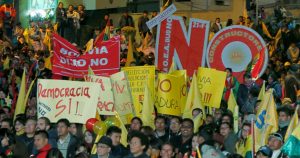
Bolivia’s president Evo Morales has been in power for three terms, one term before the constitution put into place term limits and then two after that which meets the maximum limit of two terms. Over those 12 years, Morales has done wonders for the Bolivian economy and sense of national identity. He has brought recognition to the 36 indigenous groups living in Bolivia, even making the 34 languages spoken official languages of the country. Morales has also reinvigorated the economy, increased literacy rates, improved public health, and put into place new education initiatives. However, despite his commitment to maintaining order as his third and final term is coming to a close, Morales might not relinquish his position so easily.
Morales currently plans to run for re-election for the fourth time in 2019 and while it is technically legal, Bolivia’s 2009 constitution prohibits that it. The way Morales works around it is that courts struck down term limits saying that they are a “violation of human rights”. Now, Bolivia has dueling demonstrators in the streets, one group advocating for him to stay in power and one saying he should leave. The group advocating for his continued power says that he has done so much good and will continue to work for the people if he stays in power. The other group says that this power grab ruins his legacy as a great president and that change has to come, they are cautious of countries like Venezuela and do not want to fall victim to an unchallenged power. Bolivia will find out in the coming year whether their protests work or not.
https://newrepublic.com/article/150529/fighting-democracy-lesson-bolivia
